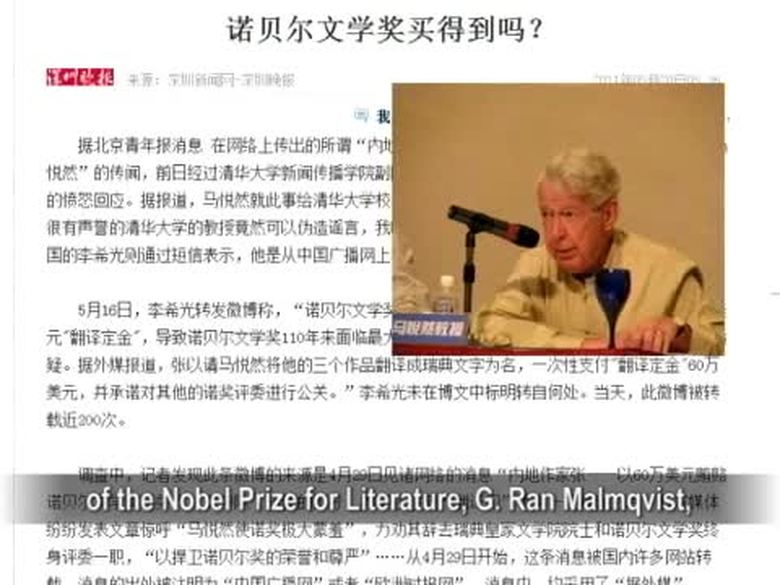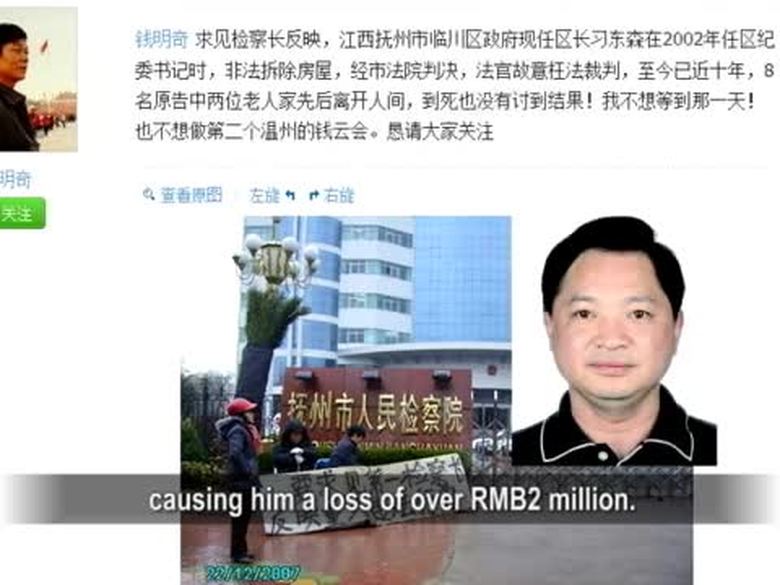【新唐人2011年6月8日訊】“如何制止中國的黑客行為”? 美國《華爾街日報》專欄撰稿人霍爾曼•詹金斯發表評論文章,他說,在1990年代,中共支持中國的海盜行為,正如現在中共支持網路黑客行為一樣。而制止中國的黑客行為,就是不再保持沉默,並且拿出證據,來跟中共「大聲」講理。
詹金斯的文章中說,中國最新一輪的網路黑客行為,所針對的不是谷歌的網路安全系統漏洞,而是谷歌「客戶」,這種黑客做法的專業名稱叫「spear phishing魚叉式網路釣魚」。
這類「網路釣魚」方式是利用電子郵件,來針對一個具體的個人,欺騙這個人透露自己的帳號密碼,讓其他人(黑客)也可以進入這個人的電子郵件收件箱和網上帳戶,而這個行為與1990年代中期,在南中國海周圍地區流行的「海盜行為」一樣。
詹金斯透露,“當時的國際海事局總幹事埃里克•艾倫說,毫無疑問,這些對公海運行船只的(海盜)行為是得到政府授意的。”在艾倫將有關事件公開之後,香港詳細公布了18個月期間的將近50起案例,內容詳細到參與海盜行為的中國軍方船只編號。”
詹金斯的文章說,東南亞地區的國家當時雖然傾向於認為,“中國(共)中央政府已經無力約束地方的權貴,那些人在國際上損害中國的國家利益。”但是,他說:“1990年代讓局面得到實際改善的是,世界各國的船運公司及其各自國家的政府,他們拋棄了膽小怕事的做法,拿出證據來跟中國大聲講理。”
而中國(共)政府終於在2000年年初,大張旗鼓的處決了13名中國海盜。這些人身穿中國軍服,他們是在1998年劫持長勝號貨輪,殺死了23名船員。
詹金斯說,“自那時以來,儘管海盜行為依然是一個問題,尤其是在印度洋海域。但中國(共)政府所支持的海盜行為,不再是明顯的麻煩來源。”
谷歌6月1號通過博客發表聲明,宣佈最新一輪的網路黑客攻擊發源地是中國濟南。攻擊目標是美國政府高級官員,和中國政治活動家,以及好幾個亞洲國家的軍方人員,和記者的Gmail電子郵件帳戶。
中國問題及網路安全專家毛文傑(James Mulvenon)博士對《美國之音》說:「他們的網路攻擊行動已經持續了5年,對像是在美國首都的大部分中國問題專家,尤其是那些經常進出政府部門的人,將這些信息匯總起來,能夠得出政府內部在中國等問題上的看法。這是獲取敏感信息的間接方式,這比侵入保密的電腦系統,要容易得多。」
毛文傑還透露,中國黑客不僅攻擊谷歌,也包括雅虎等公司的郵箱。
而美國聯邦政府已經就谷歌提出的指控展開調查。
詹金斯在這篇“如何制止中國的黑客行為”中提到,有幾十家美國公司也遭受到類似的網絡攻擊,其中包括通用電氣公司,投資銀行摩根斯坦利,迪斯尼公司。但是,大部分公司對此保持沉默,因為害怕得罪中國。
而他認為,「其實,讓局面變得更糟的最可靠途徑,就是這種沉默。」因此他文章說:「谷歌的榜樣,得到其他公司的模仿,或許才是真正有益的。」
美國「布魯金斯學會技術創新中心」研究部主任艾倫•弗裡德曼(Allen Friedman)也向《美國之音》表示,谷歌是為了維護他在全球的聲譽,而阻止中共黑客攻擊。其他想同中國做生意的公司,在同中國打交道時會遇到甚麼情況,現在被提前敲了警鐘。
新唐人記者林慧心、薛莉綜合報導
How to Stop CCP Hacker Attacks
In the article: “How to Stop Hacker Attacks from
China,” Wall Street Journal columnist, Holman
Jenkins, said that the Chinese Communist Party (CCP)
supports hacker attacks just as it supported piracy in
the 1990s. To stop the attacks, we should stop being
silent and simply show the CCP the evidence we have.
Jenkins said that China's latest round of hacker attacks
didn't target the loopholes in Google's Internet security
system, but rather Google's users,
using a method called “spear phishing.”
“Phishing” involves sending an email to a specific
person to lure them into giving out their username
and password, thereby allowing the hacker to login
to the recipient's account or other online accounts.
This behavior is similar to the widespread “piracy”
in the middle 1990s, near the South China Sea.
Jenkins revealed that, “The then Director General
of the International Maritime Bureau, Eric Ellen,
said that, there's no doubt that the open sea piracy
was supported by governments.” After Ellen revealed
this, Hong Kong announced the details of nearly 50
piracy cases in 18 months,
with some involving Chinese Navy ships.
Jenkins wrote that, countries in Southeast Asia tended
to believe that, “China's central authorities cannot
control local authorities, which are harming China's
national interest in the international community.
But what improved the condition in the 1990s was the
fact that many shipping companies and governments
from around the world stopped being afraid of China
and debated the issue with concrete evidence in hand.”
The CCP finally executed 13 Chinese pirates in the
beginning of 2000. These pirates were in Chinese
military uniform. They hijacked the Chang Sheng
ship in 1998 and killed 23 sailors.
Jenkins said that, “Since then, though piracy remains
a problem, especially in Indian Ocean area,
CCP supported piracy is no longer a main source.”
Google announced on its blog on June1 that,
a new round of email hacker attacks originated from
Jinan, China. The targeted Gmail accounts belong
to senior U.S. officials, Chinese activists,
Asian officials, and journalists.
Dr. James Mulvenon, a China affairs and Internet
security expert, told Voice of America (VOA) that,
“The CCP network attacks have lasted for 5 years
and mainly targets China experts in the U.S. capital,
especially those who visit governments frequently.
The CCP then analyzes U.S. officials' opinions,
on China related problems, by summarizing the
information. This is done to indirectly obtain sensitive
information , which is easier than directly hacking
into confidential computer systems.”
Mulvenon revealed that, besides Google, Chinese
hackers also attack other companies, including Yahoo.
The Federal Bureau of Investigation, has started an
investigation into Google's accusation.
In his article, Jenkins also stated that, dozens of U.S.
companies have also experienced similar attacks,
including General Electric, Morgan Stanley, and Disney.
But most of them kept silent for fear of offending China.
Jenkins continued: “Actually, what makes the situation
worse is this kind of silence. It is truly helpful if other
companies can learn from Google.”
Allen Friedman, Director of the Center for Technology
Innovation at Brookings Institution, told VOA that,
“Google tries to stop CCP's hacker attacks to maintain
its international reputation. It sounds an alert for other
companies, which plan to trade with China,
and what to expect when doing business in China.
NTD reporters Lin Huixin and Xue Li
看下一集

【禁聞】李娜奪冠 陳凱談「舉國體制」

【禁聞】越菲中臺陷南海爭端 美發衝突警告

【禁聞】挺毛批毛 兩派激烈交鋒 當局曖昧

【禁言博客 】走進「相互投毒」的新時代

【禁聞】諾獎評委陷“翻譯門” 與中共絕交

【禁聞】敏感期 陸媒抽籤坐堂版 怕秋後算帳

【禁聞】藥家鑫處死 民意還是陰謀?

【禁聞】用億元選舉 撬動集權體制的曹天

【禁聞】「阿拉伯之春」給中共甚麼啟示?

【禁聞論壇】為甚麼中國人勤勞而不富有?

【禁聞】錢明奇生前錄音曝光 逼得無路

【禁聞】《紅狗》:非正常活著的中國人

【禁聞】安內蒙 肇事司機判死 中共危機難解

【禁聞】黨報頻繁變調 外界指高層三派混戰

【禁聞】官批獨立候選人非法 民间仍要參選

【禁聞】清官?貪官?毛澤東爭議不斷








